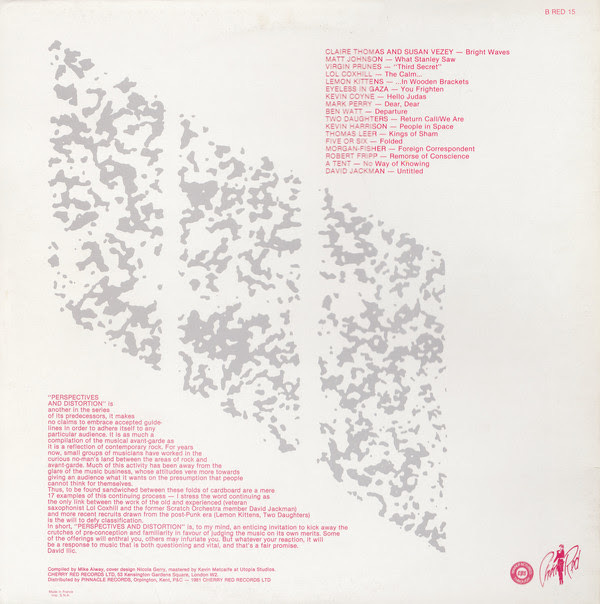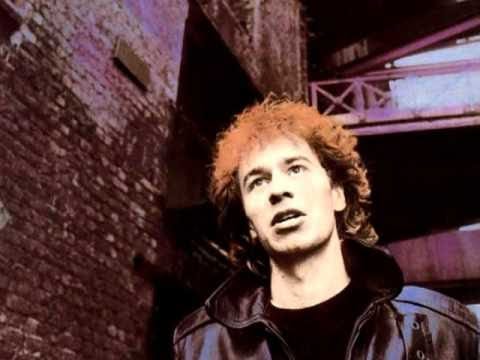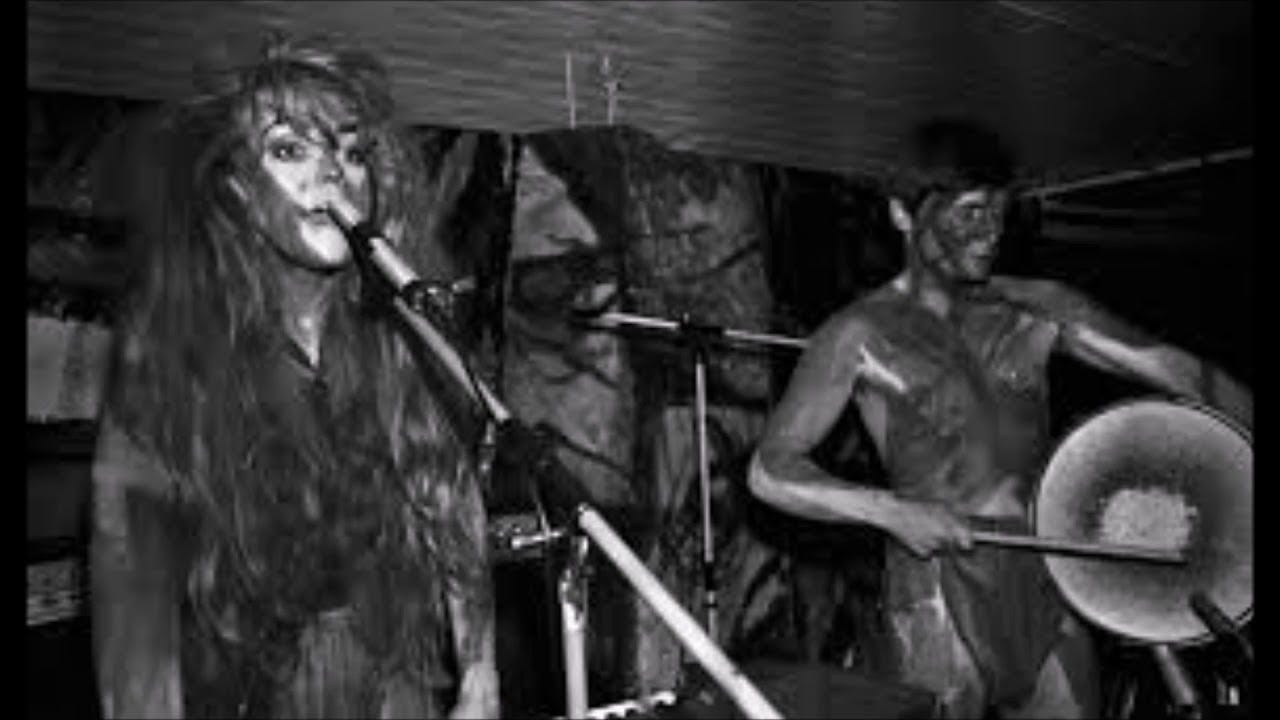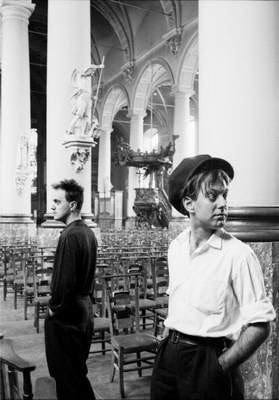You might think it’s hard to pick out the most important record in your collection, especially if you had about 1000 LPs acquired over more than 50 years. And if you have such a record, you likely played it so many times that you know every pop and click on it. Neither is the case for my selection. My choice was easy because this record made such an imprint on me when I first heard it, and although I did listen to it a lot then, it served as such an important launching pad for my taste to come that I rarely went back to it. Instead I pursued some of the artists on it in my hunt for the next sound, because this was an album filed in the bin called “Various” -- a collection of tracks assembled by a label trying to promote their talent.
As to how I acquired this record, there are only two things I can say with certainty. One is that I bought it new soon after its release in 1981. The other is that the name Robert Fripp got my attention. It was on the back cover, along with all the other contributing artists that I had not heard of. By that time Fripp was in between King Crimson albums and had done a few experimental recordings mostly with Brian Eno. I had all those in my collection and was eager to listen to what he was apparently endorsing here by his presence. I had already been listening to much of the contemporary avant-garde but it was still fairly new to me and this album would present a variety of sounds that would blow my ears open forever.
On the above back cover, designer and liner notes author David Ilic wrote:
“Perspectives and Distortion” is another in the series of its predecessors, it makes no claims to embrace accepted guidelines in order to adhere itself to any particular audience. It is as much a compilation of the musical avant-garde as it is a reflection of contemporary rock. For years now, small groups of musicians have worked in the curious no-man’s land between the areas of rock and avant-garde. Much of this activity has been away from the glare of the music business, whose attitudes vere more towards giving an audience what it wants on the presumption that people cannot think for themselves.
Thus, to be found sandwiched between these folds of cardboard are a mere 17 examples of this continuing process -- I stress the word continuing as the only link between the work of the old and experienced (veteran saxophonist Lol Coxhill and the former Scratch Orchestra member David Jackman) and more recent recruits drawn from the post-Punk era (Lemon Kittens, Two Daughters) is the will to defy classification.
In short, “Perspectives and Distortion” is, to my mind, an enticing invitation to kick away the crutches of pre-conception and familiarity in favour of judging the music on its own merits. Some of the offerings will enthral you, others may infuriate you. But whatever your reaction, it will be a response to music that is both questioning and vital, and that’s a fair promise.
I may not have understood Mr. Ilic’s statement completely at the time, but I can read it now as a personal manifesto for listening to and pursuing music. Is this not a continuation of the path that Giorgio Gomelsky was working on in the 1970’s when he started the French live music network Rock Pas Dégénéré (or Rock Not Soft Brained)? By 1981 Gomelsky had completely abandoned Europe for NYC. In this album we might be looking at some of what he left behind, perhaps in his wake. I see no direct connection in my research of the last few years, but the imprints are there in the music.
The album was released by the UK label Cherry Red. This label has an amazing history if not simply for the fact that it’s still around. They were promoting not just indie but obscure music well before 1981 and continue to do so. The founders started out promoting live shows near their home town way back in 1971. Their first show? Hawkwind. By 1978 they started the record label. In 1980 they had their first big success when they released the very first album by the Dead Kennedys, ‘Fresh Fruit For Rotting Vegetables’. I had this album of course, and I was about to say, that must be how I discovered Cherry Red. But, I just went to my collection to look at ‘Fresh Fruit…’ and I see that my copy was released by IRS records. Looks like IRS struck a deal with Cherry Red for domestic distribution in the USA. I paid little attention to such details on records at that time, which is why I didn’t hear of Gomelsky until recently even though his name is all over my record collection.
These two records, ‘Fresh Fruit…’ and ‘Perspectives…’ were released barely a year apart, and were just two of the many that Cherry put out at the time showing their tremendous dedication not only to indie music, but the diversity within indie music. One of the three original founders is still running the label today. He can tell you their full story:
The first track on ‘Perspectives…’ is a comforting wordless vocal piece with long echo treatments that gives you the feeling of drifting along with the clouds. The sound will occasionally fade away as if you just drifted into one of the clouds, and then again fade back in as you come out. The song is called Bright Waves and is credited to Claire Thomas and Susan Vezey, two individuals who it turns out never existed. Forty years of perspective on ‘Perspectives…’ reveals that the person behind this music is Phillip Sanderson who was running a cassette label at the time to showcase his own music along with some friends. Claire and Susan also appear on some of these cassette releases. Perhaps Mr. Sanderson was a little embarrassed at how much of his own music he was showcasing. Cherry Records was none the wiser in 1981, and it wasn’t until years later that Mr. Sanderson revealed the deception in interviews. One of Mr. Sanderson’s collaborators on the cassette label, called Snatch Tapes, was David Jackman whose untitled piece is the very last track, number 17 on this Cherry compilation and consists of a slowed down sound of two bowed cymbals, which feels slightly eerie and, to me, a bit soothing at the same time. I was well on my way to falling madly in love with dissonance.
The second track on ‘Perspectives…’ is by Matt Johnson who was somewhat known at the time for his work in The The, although not by me. His song ‘What Stanley Saw’ is one of the more normal sounding cuts on the album, including his heavily produced vocals which transform his voice from a nasal harshness to a harmonious chorus. I’m not sure if it reminded me of the Residents at the time, but it sure does now. I found it quirky enough that I bought his solo album ‘Burning Blue Soul’ released that same year by Cherry Red and 4AD. It would apparently get re-released later as a The The record.
Track 3 on ‘Perspectives…’ is by the Virgin Prunes, a fairly well known group in the UK at this time, sporting a decidedly new wave look combined with a minimal post-punk sound that featured some theatrical settings with their live songs, but I wouldn’t call it performance art. Definitely theater though. Acting, makeup and costumes. Gothy elements too. Their contributing track here however has nothing to do with all that. It is simply avant-garde to the max. Recorded in a gallery in Dublin, the band’s home town, it’s a simple percussive piece from start to finish with no beat but a lot of random clanging on what might be bottles, punctuated by smacks on what sounds like sheet metal. In some ways it reminds me of the musical interlude in John Carpenter’s first film Dark Star where one of the characters wants some alone time with his home-made instrument that’s set up in the bowels of the space ship. I saw this movie when it first came out. It was shown at the Sci Fi festival at my university sometime before 1979, and like this album it made a huge impression on me. It’s still one of my favorite Carpenter films.
Track 4 is by Lol Coxhill, who was then and is now a well known reed player in the small world of improvising musicians (he died in 2012). On the album notes they list some of his collaborators including half of the original Soft Machine, Mike Oldfield, The Damned, Fred Frith, and Alexis Korner. In terms of pedigree there’s only one other person on this compilation that might go deeper. We’ll get to him in a minute. I wasn’t very familiar with Coxhill and I have to admit that I’m still not. His name turns up all over the improvised music landscape, so I’ve seen it a lot. I just never got very familiar with his music. I have one vinyl record by him released in 1986 but I don’t remember when I got it and I couldn’t tell you what it sounds like. His piece here entitled ‘The Calm’ is indeed a calm, melodic multitracking of soprano saxophones that doesn’t sound improvised, but who knows. The notes simply say it was recorded at home.
The next track, number 5, is by the Lemon Kittens. It is far from calm, or melodic. It’s a disjointed combination of instruments and vocals including some backward tracking, but for me it demands my attention and is a very satisfying listen. I feel like I’ve been traveling in a foreign land by the time the piece ends. It’s called ‘... In Wooden Brackets’ and the notes say that it was recorded in various locations between 1979 and 81, which may explain the travelogue feel.
Track 6 by Eyeless in Gaza is the one that got me thinking I had discovered something. ‘You Frighten’ chugs along for over 6 minutes giving us a glimpse at this Sci Fi dystopian future we seemed to be headed for in 1981 and indeed today. The hypnotic, robotic backing track gives way to some impressive emotional wailing vocals that include some words that are imploring the listener toward something. The words can be understood, but the meaning is never clear. What they were telling me was that I had to find more of this music, and I soon did. I bought the 1981 Cherry Red double vinyl release by Eyeless in Gaza called ‘caught in flux’. After giving it a few listens I soon lost interest in this band. The experimentation exhibited in ‘You Frighten’ is completely replaced by conventional new wave trappings which at best sound like an anemic version of Tuxedomoon, SF’s exceptional post-punk art rockers of the same time, and at worst is repetitive attempts at pop that make me lurch for the ‘next track’ button today which was not an option back in the 1981 days of vinyl records, although I may have hovered over the turntable to keep things moving. They would soon find themselves opening for Depeche Mode. All the elements that I found interesting on the ‘You Frighten’ track had become annoying on the ‘caught in flux’ LP. Oh well. Win some, lose some. The risk is part of the fun.
Track 7 now brings us to the most seasoned performer on the entire album, Kevin Coyne. I did not know him then and I don’t know much about him now, but I think he can be fairly summed up as a poet who cut to the core. According to Wikipedia he was being considered to replace Jim Morrison in the Doors. "I didn't like the leather trousers!" was Coyne’s response. He was the second artist signed to Virgin Records, after Mike Oldfield, and he had no problem biting the hand that fed him when in 1979 he wrote and recorded a single for Virgin called "Having a Party", a scathing attack on Richard Branson...
We're having a party, oh what fun
See the little girls now see how they squeal and run
Out on the patio, millionaires a go go
If you want another drink, there's plenty more under the sink
Chorus: Spot the millionaires, aristocrats, big teddy bears , fools in fools hats
Discussing my future, I wonder why
They tell me I'd be much better off if I told one little lie
Smoke up the chimney
Bones of pop stars
...
By 1980 his time had run out at Virgin.
His next couple of albums would be released by Cherry Red, hence his inclusion here with the song ‘Hello Judas” which ends like this ...
...
Hello Judas, how're you doing?
Won't you come and eat with me?
Say, hello Judas, how are you doing?
Won't you come and eat with me?
Say, I love you Judas
You're a fine one
As fine as fine as a friend could be
Yes Hello Judas, you're a fine one
As fine as fine as a friend could be
So come on inside, come on in
Won't you join the company
Say come on inside, come on in
Won't you join the company?
Track 8 ends side one of the album with a purely spoken word piece that seems like a nice transition after the fairly jarring jump from the truly out-there sounds of Lemon Kittens and Eyeless in Gaza to the down-to-earth morality tales of Kevin Coyne. Mark Perry gives us his reading of ‘Dear, Dear’ which must be a heartfelt story of a lost friend, but it unfortunately comes off as simply a reading. It turns out that Mark Perry was primarily a journalist, and a ground breaking one at the start of punk rock in England. He did a few stints in bands and that’s what he was transitioning to here for Cherry Red.
I’m running long again with this blog entry, so let me wrap up side two of the album quickly.
Another couple of Sci Fi futuristic (or maybe it’s retro) pieces are found on track 10 by Two Daughters - ‘Return Call/We Are’ and track 11 by Kevin Harrison - ‘People in Space’.
And then there’s track 13 by Five or Six - ‘Folded’ which could have easily found a home in Kubrick’s ‘2001’.
Track 15 by Robert Fripp - ‘Remorse of Conscience’ is a fairly boring piece of Frippertronics using what I suspect is a guitar synthesizer, one of the worst musical instrument inventions EVER.
It’s no small irony that the track that may have piqued my interest to buy this album turned out to be one of the least interesting on it.
And so I dub the album ‘Perspectives and Distortion’ the most important record in my collection, not just because it pointed the way forward for me, since I was already moving in that direction, but because it also broadened my horizons and got me to quicken my pace. None of the artists unknown to me on this album ever became a favorite of mine, and yet together they presented a music of the avant-garde that I continue to love and understand better today. For that I thank them all, and especially Cherry Red.
You can find the full album here:
Various artists - Perspectives and Distortion (1981) (Full compilation)














I'm familiar with several of the artists on this compilation, including Coyne, Coxhill, Lemon Kittens, Virgin Prunes, Eyeless in Gaza and Matt Johnson. I certainly remember seeing the record in shops. We probably carried it at Singles Going Steady in Portland where I was the buyer for all the unusual records we got from Rough Trade Distribution. I can't remember if I actually heard it though. The record that comes to mind as having this sort of impact for me was released the previous year, and also distributed by Cherry Red, Morgan Fishers' Miniatures Compilation. I can't say it opened up huge new vistas for me as I was already familiar with most of its 51 artists, but it was a great summing up of what was interesting around that time. It includes Fripp, Coyne and Coxhill, along with Frith, David Bedford, Ivor Cutler, Gavin Bryars, Neil Innes (well really his five year old son), The Residents, Robert Wyatt, Ralph Steadman, etc. etc. Even my favorite band of the time, Etron Fou, though their contribution is not worthy of them. The artists new to me that had the most impact were Veryan Weston, whose band, Stinky WInkles, performed a Movement from a Webern string quartet, and George Melly who intoned part of the Ur Sonata which he'd once used to nonplus a gang of toughs he encountered outside a Manchester club. It was a superbly disorienting listen at the time, and holds up as one of the greatest of all compilation albums due to its sheer scope.